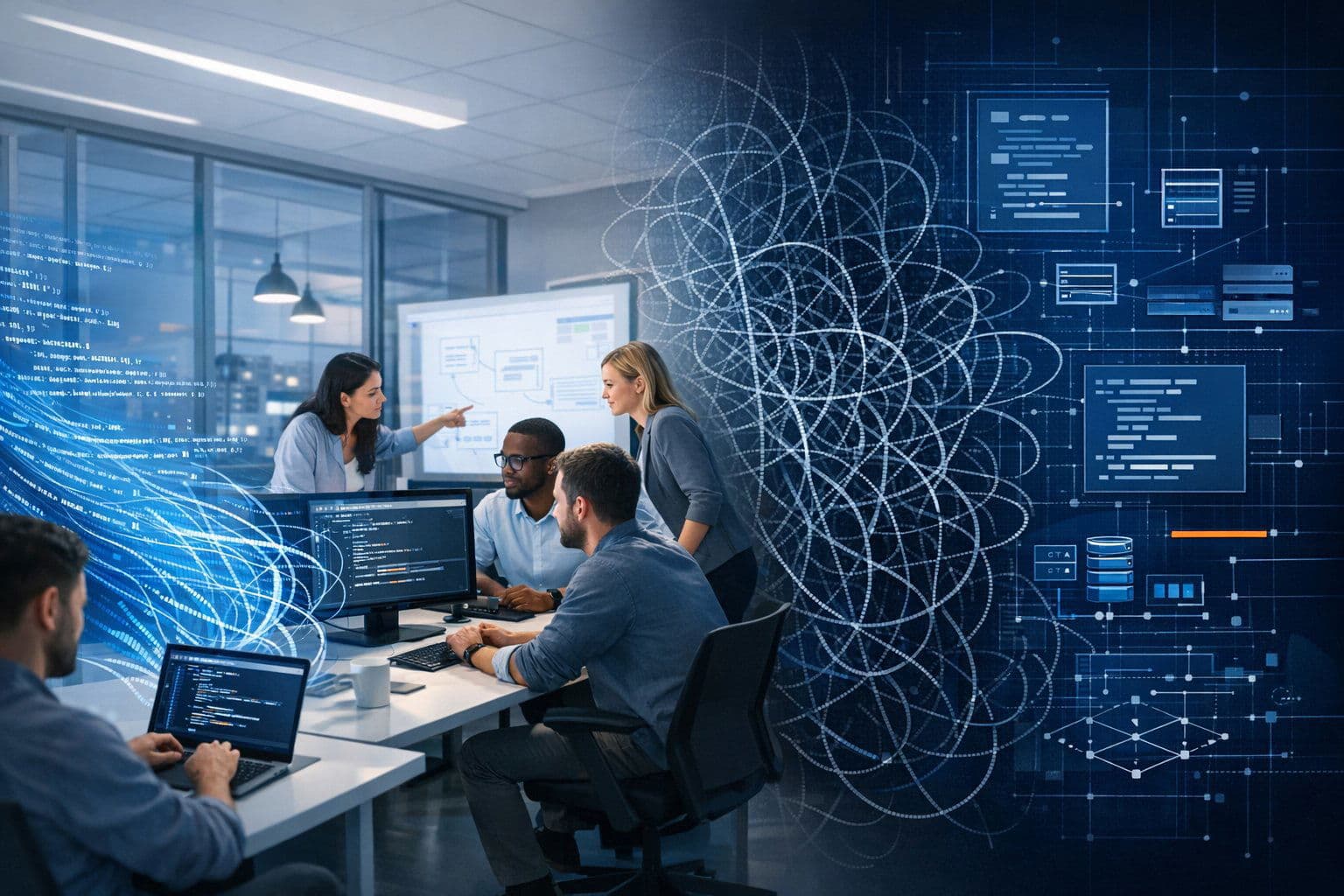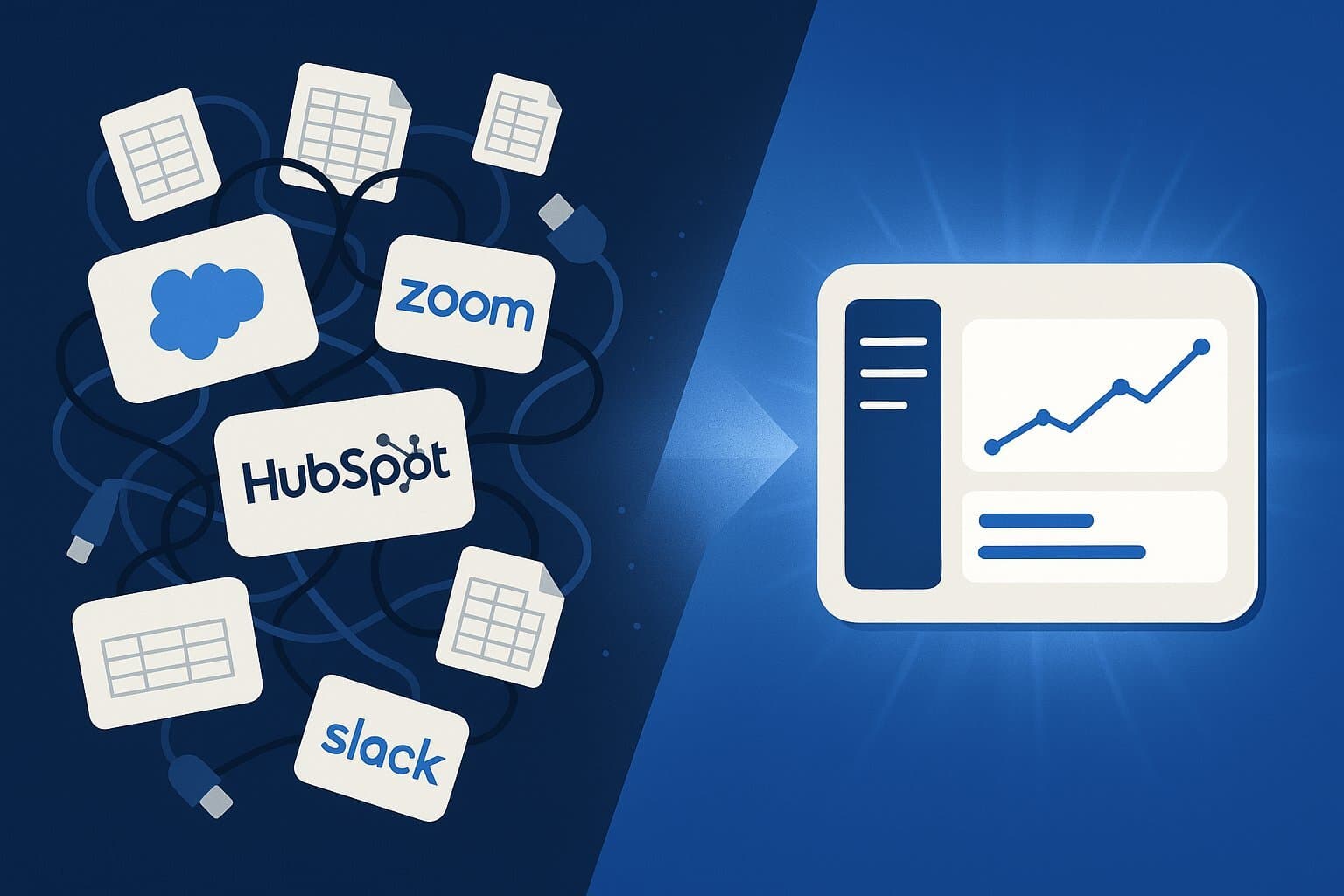Legacy Software Modernization
By: Bryan Reynolds | 06 February, 2026

This Strategic CFO research report argues that rising SaaS inflation and plunging AI-driven software production costs have reversed the traditional build-vs-buy calculus, making AI-augmented custom development an asset-first strategy; Baytech prescribes a governed, phased “Engineered AI Development” approach (Clean Code Protocol, Traffic Light governance, phased delivery) to capture cost savings, secure data sovereignty, and convert software into balance-sheet value.
Read MoreBy: Bryan Reynolds | 28 January, 2026

This report explains the "AI Trust Paradox": how rapid adoption of LLMs and "Vibe Coding" accelerates feature delivery but creates hidden AI technical debt, reduced trust, and higher long-term costs, and it prescribes Baytech’s governance, Tech Debt Score (TDS), and Clean Code protocols to manage risk and preserve enterprise value.
Read MoreBy: Bryan Reynolds | 16 January, 2026

The article explores the evolution and advantages of Headless CMS architectures, emphasizing their role in enabling omnichannel, future-proof digital experiences through decoupled, API-driven models that improve flexibility, security, and scalability.
Read MoreBy: Bryan Reynolds | 01 January, 2026

The article introduces Google's Antigravity, a revolutionary AI-native IDE, and analyzes its architecture, capabilities, strategic implications, and integration challenges within enterprise workflows, emphasizing its potential to transform software development into an agent-driven, asynchronous process.
Read MoreBy: Bryan Reynolds | 24 December, 2025

This article argues that investing strategically in Quality Assurance (QA) significantly enhances profitability by reducing costs, lowering risks, and accelerating growth in software-driven enterprises.
Read MoreBy: Bryan Reynolds | 22 December, 2025

This article explores the critical role of change management in technology projects, emphasizing emotional engagement and human factors to improve adoption and reduce failure rates.
Read MoreBy: Bryan Reynolds | 26 November, 2025

This article emphasizes the importance of adaptive maintenance in software management, highlighting how it ensures software remains relevant, compliant, and secure amid rapid technological changes while offering strategic guidance for proactive long-term planning.
Read MoreBy: Bryan Reynolds | 25 November, 2025

This article provides an in-depth guide for executives on choosing ASP.NET for custom software development, emphasizing strategic benefits, technological advantages, and partnering tips.
Read MoreBy: Bryan Reynolds | 10 November, 2025

This article emphasizes the importance of preventive maintenance for software systems, highlighting its strategic benefits in reducing costs, preventing downtime, and maintaining code quality to sustain business growth and competitiveness.
Read MoreBy: Bryan Reynolds | 16 October, 2025

This article explores the urgent and evolving threat that quantum computing poses to current cryptographic systems, underscoring the need for technology leaders to begin a decade-long transition to post-quantum cryptography now. It details how quantum computers will break today's public-key encryption, highlights current projections for the arrival of quantum-capable machines, explains the 'Harvest Now, Decrypt Later' risk, and outlines the recently finalized NIST standards for quantum-resistant algorithms. Finally, the article provides a pragmatic four-step action plan for organizations aiming to secure their data and modernize their cryptographic infrastructure before Q-Day arrives.
Read MoreBy: Bryan Reynolds | 07 October, 2025

This article dispels the outdated 'build vs. buy' narrative in enterprise technology architecture, arguing that the most successful organizations adopt a hybrid model that combines best-in-class SaaS solutions for commodity functions with custom-built microservices for differentiated business logic. It explores the pitfalls of all-in monolithic and SaaS architectures, advocates for a composable, API-driven approach that maximizes agility, reduces vendor lock-in, and focuses engineering resources on true competitive advantage. Using a logistics SaaS company as an example, the article presents a playbook for adopting a hybrid strategy and highlights key business benefits such as innovation velocity, strategic flexibility, and optimized total cost of ownership.
Read MoreBy: Bryan Reynolds | 05 October, 2025

This article explores the strategic inflection point at which businesses should consider building custom software instead of relying on commercial off-the-shelf (COTS) solutions. It outlines five major signs indicating the need for a bespoke solution, such as having unique core processes, the proliferation of spreadsheets and manual workarounds, complex integration challenges, loss of control over data and product roadmap, and uncovering a potential new market opportunity. The article provides a detailed total cost of ownership analysis, quantifies operational inefficiencies, and offers a strategic framework for successful custom software development, emphasizing an MVP-first, agile, and advisory-led approach. It concludes by positioning custom software as a strategic asset, not just a cost center.
Read MoreBy: Bryan Reynolds | 04 October, 2025

This in-depth article explores the strategic and technical transformation required for enterprises to succeed in today's volatile market by adopting a composable architecture. It details why traditional monolithic systems are failing, outlines the principles and benefits of composability via the MACH framework (Microservices, API-first, Cloud-native, Headless), and demonstrates the measurable business value—such as agility, speed-to-market, improved customer experience, and risk mitigation—of moving to a modular enterprise model. The article further addresses the cultural and organizational change necessary for such a transformation, provides a pragmatic roadmap for CIOs, and quantifies ROI using real-world case studies.
Read MoreBy: Bryan Reynolds | 30 September, 2025

This article exposes the costly myth behind 'quick and easy' off-the-shelf (COTS) software solutions, arguing that the sticker price represents only a fraction of the true Total Cost of Ownership (TCO). It delves into the hidden expenses of implementation, integration, customization, training, productivity loss, and ongoing vendor lock-in that frequently cause projects to vastly overshoot original budgets. Supported by industry studies and practical frameworks, the article challenges business leaders to adopt rigorous TCO analysis and strategic thinking when selecting software, often revealing that custom solutions offer superior long-term value, risk mitigation, and alignment with business objectives.
Read MoreBy: Bryan Reynolds | 20 September, 2025

This article explores the growing trend of B2B enterprises shifting from OpenAI's ChatGPT/GPT-5 to Google's Gemini 2.5 Pro for their mission-critical AI needs. It outlines the end of the 'one-size-fits-all' era in enterprise AI and highlights Gemini's distinct advantages, such as its groundbreaking 1-million-token context window, native multimodality, and deep algorithmic reasoning capabilities. The article also examines which use cases benefit most, from finance and healthcare to legacy software modernization, and offers comparative ROI analysis for business leaders. Strategic recommendations advise enterprises to adopt a multi-model strategy, relying on expert partners like Baytech Consulting to architect flexible, results-driven AI ecosystems.
Read MoreBy: Bryan Reynolds | 03 September, 2025

This executive guide demystifies cloud-native architecture and its business impact, going well beyond technical jargon to explain how modern organizations can drive agility, resilience, and value creation. It explains core concepts like microservices, containers, and managed Kubernetes, highlighting the cultural and operational changes required for a successful transition. The article provides a business-focused analysis of cloud-native ROI, total cost of ownership (TCO), cost comparisons between managed versus DIY Kubernetes, and delivers a phased, actionable framework for getting started. Designed for business leaders, the guide underscores that cloud-native transformation is a pivotal business strategy essential to closing the agility gap and remaining competitive in today’s digital economy.
Read MoreBy: Bryan Reynolds | 30 August, 2025

This executive guide explores the rapid transformation of global manufacturing through the rise of the smart factory, fueled by real-time data, artificial intelligence (AI), and pervasive connectivity. The article breaks down what defines a smart factory—beyond just robotics—by detailing its technological anatomy, the driving market forces, and the proven business benefits such as radical efficiency, agility, and quality improvements. It uses real-world case studies to illustrate smart technologies in action and addresses the main challenges organizations face, from legacy systems to cybersecurity and skills gaps. The guide concludes by demonstrating how the principles of the smart factory are universally applicable across industries like logistics, healthcare, and finance, laying out a pragmatic roadmap for executives to begin their journey toward becoming an intelligent, adaptive enterprise.
Read MoreBy: Bryan Reynolds | 23 August, 2025

This article explores the accelerating trend among healthcare organizations to modernize Electronic Health Records (EHRs) and core systems by migrating to cloud-native platforms. Driven by post-pandemic pressures, escalating technical debt, interoperability mandates, workforce burnout, rising patient expectations, and the transformative potential of AI, over 60% of healthcare leaders are prioritizing cloud-based modernization. The article deconstructs the financial, operational, and strategic imperatives for moving beyond outdated legacy systems, details practical migration strategies, and highlights the growing role of custom integration partners in building truly interoperable, agile digital health ecosystems.
Read MoreBy: Bryan Reynolds | 21 July, 2025

This comprehensive guide demystifies AI integration for B2B executives, offering a practical, step-by-step roadmap for adopting artificial intelligence in enterprise environments. The article addresses the urgency of AI adoption, how to identify impactful use cases, the realities of data readiness, and the challenges of integrating AI with legacy CRM and ERP systems. It provides a realistic breakdown of the total cost of ownership, evaluates build vs. buy vs. partner strategies, and showcases real-world success stories that highlight measurable business value. Designed as an actionable manual, it empowers leaders to move from strategy to execution, minimize risk, and maximize ROI with the support of experienced partners like Baytech Consulting.
Read MoreBy: Bryan Reynolds | 01 July, 2025

This comprehensive article explores the deep-rooted and escalating challenges of maintaining legacy enterprise software, examining its wide-ranging impact on technical architecture, operational performance, financial viability, workforce dynamics, and long-term strategic agility. It presents a critical analysis of how outdated systems accumulate technical debt, introduce integration hurdles, compromise security, restrict scalability, and drain both financial and human resources. The article underscores how the inertia to modernize leads to strategic paralysis, erodes competitive advantage, and ultimately places an organization’s survival at risk. It calls for urgent, proactive engagement and strategic modernization planning as a vital business imperative.
Read MoreBy: Bryan Reynolds | 27 June, 2025

Outdated software presents a significant and often overlooked cybersecurity threat due to unpatched vulnerabilities, lack of vendor support, and increased exploitability. This comprehensive analysis explores the mechanisms by which outdated software becomes a target, using real-world breaches like MOVEit, Equifax, and Log4Shell to underscore the risks. It examines vulnerability taxonomies, intelligence tracking systems, and mitigation strategies—including patch management, EOL controls, and Secure-by-Design principles. The article emphasizes that addressing outdated software is not just a technical necessity, but a critical business imperative for operational resilience and long-term cybersecurity maturity.
Read MoreBy: Bryan Reynolds | 25 June, 2025

This comprehensive article explores the complex and often daunting challenges organizations face when trying to scale legacy software systems. It dissects the architectural, data, technical debt, operational, and human capital issues that create significant roadblocks to scalability, while also highlighting the severe business ramifications of inaction, including financial losses, reduced agility, and heightened risk. Drawing from strategic frameworks, modernization taxonomies, and case studies like Lufthansa Technik and Python-based system upgrades, it provides actionable recommendations for transforming these outdated systems into scalable, future-ready platforms. The piece emphasizes that modernization is not a one-time fix, but a continuous journey requiring careful planning, cultural change, and investment in both technology and people.
Read MoreBy: Bryan Reynolds | 17 June, 2025

This comprehensive article explores the root causes of performance degradation in legacy software systems, offering a diagnostic framework that spans architecture, hardware, databases, technical debt, scalability, integrations, and maintenance. It emphasizes how these elements often interact synergistically, resulting in compounded inefficiencies that cannot be resolved with isolated fixes. The report helps business and technical stakeholders identify and understand systemic bottlenecks to guide decisions around optimization, modernization, or replacement, aiming to restore efficiency and extend system longevity.
Read MoreBy: Bryan Reynolds | 16 May, 2025

Business owners must strategically decide whether to refactor or rebuild their software systems, a choice with significant financial, operational, and competitive implications. Refactoring involves improving the internal structure of existing code to enhance maintainability and efficiency without altering core functionality, offering lower risk and cost but limited transformation. Rebuilding, on the other hand, entails creating a new system from scratch to overcome deep technical debt, adopt modern technologies, or align with major strategic shifts, offering long-term benefits but carrying higher risk and investment. This decision should be guided by a thorough assessment of technical debt, business strategy, financial constraints, team capabilities, risk tolerance, and opportunity costs—recognizing that the optimal path depends on each company’s unique context and goals.
Read MoreBy: Jeff Skvorc | 18 November, 2024

Baytech Consulting is honored to be recognized as a 2024 Fall Clutch Global Award winner in several areas including Software Development, Web Development, and App Modernization. This award is a testament to the excellent client work we have delivered this year as recognized through the voice of our customers in their reviews on Clutch. Clutch Global Awards showcases the very best in the B2B services industry worldwide.
Read More

